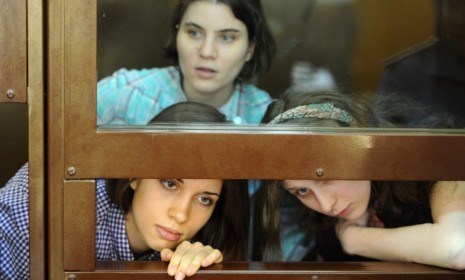The greatest threat to Putin's rule: A feminist punk band?
Three young women could face years in jail for their political protest, and the trial has turned the musicians into the face of dissent in authoritarian Russia

When pro-democracy demonstrations broke out in Russia late last year, Vladimir Putin could have hardly expected that the most publicized protest to his rule would come from a feminist punk band named Pussy Riot. But that's exactly what happened. Three members of the band — Nadezhda Tolokonnikova, Yekaterina Samutsevich, and Maria Alekhina, all in their 20s — went on trial this week on charges of inciting religious hatred for holding an anti-Putin protest in Moscow's Cathedral of Christ the Savior in February. Specifically, the trio is accused of hooliganism and hate crimes for conducting a boisterous "prayer" to the Virgin Mary to kick Putin out of power. (A video of the protest, which went viral, can be seen below.) The young musicians each face seven years in jail, and the severity of the potential punishment has drawn international condemnation, with stars like Sting and Madonna calling for clemency and Amnesty International describing the three women as "prisoners of conscience." Here, a guide to their case:
Who is Pussy Riot?
A "punk-feminist collective" composed of anonymous "riot grrrl provocateurs," says Joshua Keating at Foreign Policy. The group is known for conducting "spontaneous stunts like appearing in Red Square to perform a song called 'Putin Pissed Himself.'" Other songs include "Fuck the Sexist, Fuck Putin's Henchmen" and "Death to Prison, Freedom to Protest." They usually wear ski masks to remain anonymous, though the three bandmembers on trial have been identified.
The Week
Escape your echo chamber. Get the facts behind the news, plus analysis from multiple perspectives.

Sign up for The Week's Free Newsletters
From our morning news briefing to a weekly Good News Newsletter, get the best of The Week delivered directly to your inbox.
From our morning news briefing to a weekly Good News Newsletter, get the best of The Week delivered directly to your inbox.
What were they protesting?
Putin's authoritarian rule, which has been bolstered over the past decade by support from the Orthodox Russian Church. Forced underground in the atheist days of the Soviet Union, the church has enjoyed a resurgence in the Putin era and is determined to see the three women punished. The church says their behavior caused grave moral damage to the faithful, and witnesses for the prosecution described the pain caused by the women's "devilish skipping" in front of the church's "heavenly gates," giving the trial the feel of a literal witch hunt.
How did the women plead?
The women, appearing at trial in a glass-plated cage, pleaded not guilty to the charges, even as they admitted that they may have made an "ethical mistake."
A free daily email with the biggest news stories of the day – and the best features from TheWeek.com
Why is the maximum sentence so harsh?
"A brief arrest or citation might have been appropriate for the stunt," says The Washington Post in an editorial, "but months or years behind bars is grossly excessive." Critics say that Putin's tolerance for the pro-democracy movement is waning, and that he intends to make an example out of the three women. The case is now seen as a "measure of the Kremlin's resolve in squelching political dissent expressed in unapproved settings," say David M. Herszenhorn and Andrew Roth at The New York Times.
Will there be a backlash?
Possibly. The trial has "put three very human and, in many ways, sympathetic faces on the political opposition movement," say Herszenhorn and Roth. The crackdown also betrays a deep sense of insecurity for a supposedly all-powerful ruler. "What is it about these artists, all women in their 20s, two of whom are also the mothers of young children, that so frightens Russia's leadership?" asks Canada's The Globe and Mail in an editorial. Indeed, Sting, of all people, expressed it best in his protest of the trial, saying, "A sense of proportion — and a sense of humor — is a sign of strength, not a sign of weakness."
Sources: Agence France Presse, Bloomberg, Foreign Policy, The New York Times (2), Reuters, The Wall Street Journal, The Washington Post
-
 Will AI kill the smartphone?
Will AI kill the smartphone?In The Spotlight OpenAI and Meta want to unseat the ‘Lennon and McCartney’ of the gadget era
-
 Must-see bookshops around the UK
Must-see bookshops around the UKThe Week Recommends Lose yourself in beautiful surroundings, whiling away the hours looking for a good book
-
 A Nipah virus outbreak in India has brought back Covid-era surveillance
A Nipah virus outbreak in India has brought back Covid-era surveillanceUnder the radar The disease can spread through animals and humans